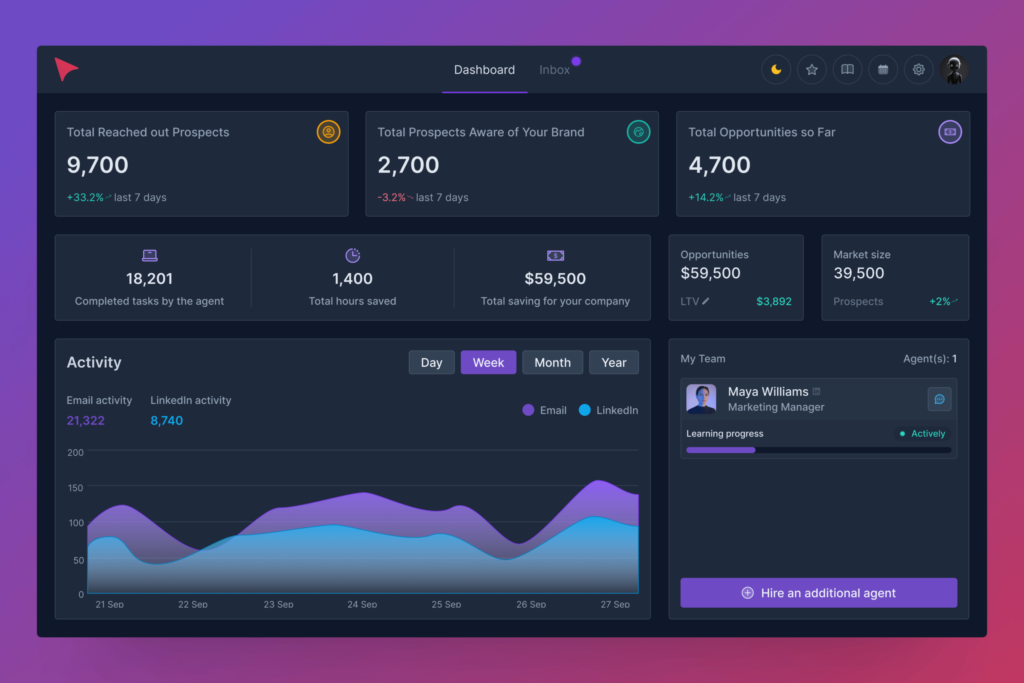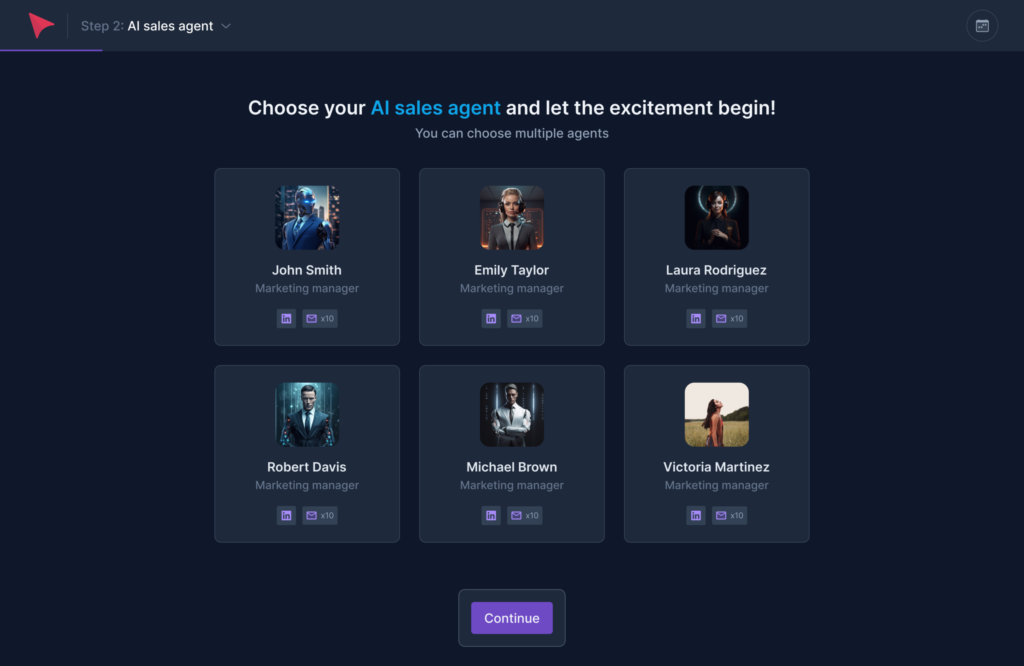Ever consider how many possibilities can be lost just by being reluctant to pick up the phone? Though intimidating, cold calling is still one of the most straightforward and successful ways for recruiters to get in touch with possible hires. Indeed, did you know that 78% of decision-makers have responded to a cold call by scheduling an appointment or attending an event? Unquestionably, cold calling can improve your recruiting efforts, as this statistic shows.
This post is to serve as your go-to manual for recruiting cold calling. We’ll go over best practices, show you scripts created by AI to increase your productivity, and look at other approaches including email and social media outreach. Recruiting new hires or experienced professionals alike will find insightful information to improve their approach.
Understanding Cold Calling in Recruitment
In hiring, cold calling is contacting prospective applicants directly who have been found through databases or study. In an attempt to swiftly determine interest and credentials, recruiters customize scripts to talk about job offers. This method improves the proactive recruiting efforts of the organization and helps create a pool of competent applicants for open positions both now and in the future.
To engage prospective prospects who aren’t actively looking for new chances is the main objective of cold calling. Fast-paced recruiting settings require direct communication lines, which our approach helps create and enables for instant response.
Pros and Cons
Advantages
- Cold calling gives recruiters the chance to get in direct touch with applicants, allowing for quick conversation and the development of relationships.
- Personalized Approach. The outreach is more engaging and personalised when every call is customized to the particular candidate.
- Quicker decision-making is made possible by recruiters’ real-time capacity to assess prospects’ interest and fit for the role.
Disadvantages
- Time-Consuming. Researching, phoning, and following up with prospects can take a long time when cold calling.
- Potential for Rejection. Since some candidates won’t be interested in or available for the opportunities offered, recruiters can encounter a high percentage of rejection.
- Unwanted calls may be seen by some candidates as intrusive, which could damage the reputation of the recruiter or the firm.
Preparing for Cold Calling
Targeting and Research
Good cold calling begins with careful planning and investigation. Recruiters have to find the ideal applicants who will not only fit the job description but also probably be open to new chances. Getting thorough information about the professional interests, present jobs, and career histories of the candidates is part of this. As much relevance and individualization as feasible should be ensured in the outreach.
Goal & Objective Setting
Define precise goals and objectives before beginning the cold calling process. Establishing success indicators, such response rates, interview setup rates, and finally hiring rates, is part of this. Recruiters who use these metrics to set reasonable goals can keep their attention and gauge how successful their cold calling campaigns are.
Crafting a Script
Cold calling success mostly depends on a well-written script. It acts as a road map for the discussion, making sure that all important topics are covered and providing for flexibility to change as the discussion progresses. Scripts need to be tailored to particular situations, including the background of the applicant, the particular job opening, and any possible drawbacks. This customizing increases the possibility of successfully involving applicants and advancing them through the hiring process.
Read also – B2B Sales Cold Calling Script Examples with Pro Tips
Best Practices for Cold Calling in Recruitment

Building Rapport
Cold calling done right requires rapport building. Using the candidate’s name, bringing up particulars from their work history, and showing a sincere interest in their professional goals are all ways to establish trust fast. A good tone for the discussion is established by personalization, which shows respect for the candidate and their achievements. An engaged answer and a productive conversation can be distinguished by this personal touch.
Effective Communication
Cold calling is mostly dependent on effective communication. This includes concise messaging to keep the discussion on track and the value proposition clearly understood, as well as active listening, in which the recruiter pays great attention to the candidate’s answers. Make sure the opportunity is expressed properly, staying away from jargon and too complicated justifications. Engaging the candidate furthermore helps to customize the discussion to their particular interests and concerns.
Handling Objections
Recruitment professionals must be able to politely handle objections. Typical complaints could be dissatisfaction with the job as it is, indifference to new chances, or problems with timing. Recruiters need to get ready answers that politely address these issues and offer details that could change people’s minds, such the possibility of professional growth or special advantages of the new position. Encouraging prospects to give the possibility further thought without feeling under pressure requires being upbeat and persistent without being pushy.
Want to know more? Read also – Cold Calling: Best Day & Time Chosen by AI
Overcoming the Fear of Cold Calling
One frequent recruiting obstacle is a dread of cold calling. Many times, it starts with fear of being rejected or upsetting someone’s day. This anxiety has a psychological connection to a very intimidating dread of failing or receiving a bad evaluation. The first step in controlling the anxiety related to cold calling is realizing these elements.
Strategies for Getting Over Fear
Preparation and Practice
One must be adequately prepared. This calls for familiarizing oneself with the candidate’s background, outlining the discussion clearly, and practicing the script. Reducing fear, practice helps develop confidence and smoothness in delivering.
Visualisation Strategies and Positive Mindset
Fear can be much reduced by developing a positive attitude. Seeing calls that go well and the results might assist to create a positive atmosphere for the exchange. Recruiters who help candidates take advantage of maybe life-changing professional possibilities should also validate their abilities and the value they offer. This change in viewpoint—from one of seeing cold calling as an invasion to one of seeing it as a useful interaction—can help to reduce a lot of the anxiety around the procedure.
Interested in details? Check out our article – Get Over the Fear of Cold Calling NOW – 5 Proven Tips
AI-Written Cold Calling Scripts for Recruitment

Script 1: Initial Contact
“Hello [Candidate’s Name], this is [Your Name] from [Your Company].” I saw your [Field/Sector] accomplishments on [Platform] and was amazed. I’m writing to talk about a possible job that fits your background and abilities nicely. Are you free to discuss this now?”
Explanation:
This script is written to make a good first impression and establish a polite tone by acknowledging the candidate’s achievements right away. Bringing up where you acquired their information personalizes the call and gives the impression that the candidate is being chosen rather than being part of a large outreach.
Script 2: Follow-Up Call
“Hi [Candidate’s Name], it’s [Your Name] again from [Your Company]. We spoke last week about a unique role in [Field/Sector]. I wanted to see if you’ve had a chance to think it over and if you have any questions or thoughts you might want to discuss. Is this a good time?”
Explanation:
This follow-up script is gentle yet direct, reminding the candidate of the previous conversation while inviting further engagement. It helps maintain the connection without being too intrusive, showing consideration for the candidate’s decision-making process.
Script 3: Voicemail Message
“Hello [Candidate’s Name], this is [Your Name] from [Your Company]. I’m reaching out to discuss a career opportunity in [Field/Sector] that seems like a perfect match for your skills. I’d love to tell you more about it and see if it interests you. Please give me a call back at your convenience at [Your Phone Number]. Looking forward to connecting!”
Explanation:
The voicemail is clear and instructive, giving the prospect just enough information to pique their curiosity without being overly wordy. Including a callback number ensures they can easily reach you, emphasizing a desire for two-way communication.
Script 4: Job Opportunity Introduction
“Thanks for taking the time to speak with me, [Candidate’s Name]. I’d like to introduce you to a role as [Job Title] at [Your Company], where your background in [Relevant Experience] would be a tremendous asset. This position focuses on [Key Responsibilities] and offers [Briefly Mention Benefits]. What are your initial thoughts on this opportunity?”
Explanation:
This script introduces the job role clearly and ties the candidate’s experience directly to the job’s responsibilities, making the opportunity relevant and appealing. Briefly mentioning the benefits sparks interest and invites the candidate to engage more deeply with the proposition.
Script 5: Closing Call
“[Candidate’s Name], I appreciate you taking the time to discuss this opportunity. Based on our conversation, it sounds like a great fit. What are the next steps you’d like to take? I can arrange for an interview or send over more detailed information, whatever suits you best.”
Explanation:
The closing call script aims to seal the initial interest into actionable steps. It respects the candidate’s pace and preference, offering options for deepening engagement, which can lead to a formal interview or further information exchange based on their comfort level.
Interested in details? Check out our article – B2B Sales Cold Calling Script Examples with Pro Tips
Common Mistakes in Cold Calling
Mistake 1: Lack of Preparation
Consequences. Going into a cold call without appropriate preparation can result in a lack of confidence, an inability to adequately answer inquiries, and potential damage to the recruiter’s and the company’s professional image. Candidates can immediately detect unpreparedness, which may discourage them from taking the task seriously.
How to Avoid. Conduct thorough research on the candidate’s past, the position being offered, and the company’s beliefs and culture. Having a clear script and potential solutions to anticipated inquiries or objections can also raise confidence and improve the flow of the conversation.
Mistake 2: Talking Too Much
The importance of listening. Dominating the conversation can prevent the recruiter from understanding the candidate’s needs, concerns, and motivations, which are critical for determining fit and interest. Listening more than talking allows the recruiter to personalize the conversation to the candidate’s professional goals and interests.
How to Avoid. Encourage the candidate to talk by asking open-ended questions and attentively listening to their responses. This not only demonstrates respect, but also provides useful insights that can help steer the conversation and recruitment strategy.
Mistake 3: Not Following Up
The Importance of Timely Follow-ups. Failure to follow up after an initial cold contact can make the candidate feel undervalued and may push them to seek other alternatives. Timely follow-up is crucial for keeping the recruitment process moving forward and reaffirming the recruiter’s interest in the candidate.
How To Avoid. Set reminders to follow up within a reasonable time range, typically a few days to a week, depending on the circumstances of the chat. Maintain a polite and professional tone in your follow-up discussions, demonstrating genuine interest in the candidate’s decision-making process.
Mistake 4: Ignoring Personalization
Benefits of Personalized strategy. When cold phoning, a one-size-fits-all strategy can come across as impersonal and disengaging. Personalizing the call demonstrates that the recruiter has taken the time to understand the candidate and their unique qualifications, and is really interested in providing them with a suitable position.
Avoid. Tailor each call to the unique candidate by discussing details from their job history or emphasizing shared connections or interests. This establishes a relationship and raises the likelihood of receiving a positive reaction.
The Impact of AI on Cold Calling: Revolutionizing Recruitment
Redefining the recruiting scene is artificial intelligence (AI), especially in the area of cold calling. An age of efficiency, accuracy, and effectiveness is about to dawn as AI gets more and more included into hiring procedures.
By automating the most repetitive processes, AI simplifies the cold calling process and frees up recruiters to concentrate on having deeper conversations with candidates. Using this technique, one may quickly find the best applicants from large databases, which saves a great deal of time during the first screenings. Predictive analytics, which determines when to contact applicants, also helps AI improve call times, thereby boosting the likelihood of fruitful conversations.
Technology Applications for Recruiters
AI improves communication personalization by enabling recruiters to speak with hundreds of possible prospects in a way that seems uniquely designed. By providing information from interaction patterns and data trends, it also improves decision-making and helps recruiters to improve their tactics.
Recruiters are also more productive and have more time for strategic operations when AI can automate repetitive chores like setting up follow-ups or initial screenings. Furthermore, AI contributes significantly to lessen human bias and promote a more fair hiring process by emphasizing data-driven standards for candidate selection.
AI is not only going to change cold calling in recruiting but also revolutionize hiring results with its promise to improve targeting, efficiency, and inclusion. Its ability to improve and transform hiring procedures is still enormous and enticing as long as technology develops.
Curious for more insights? Dive into our detailed article – How AI Cold Calling is Better Than Human: Tools + Tips
Cold Calling Alternatives
Long a staple of recruitment, cold calling has given way to a number of substitutes that provide recruiters with more options for interacting with possible applicants. Depending on various recruiting strategies and candidate preferences, these techniques can either supplement or occasionally replace traditional phone conversations.
Contact by Email
Recruiters can send applicants thorough messages and attachments via email outreach, giving them enough of background information before they choose to interact. Email outreach that works is all about being clear and personalized. Personalization of every email shows sincere attention, and strong subject lines and succinct body promote greater interaction. Although email enables convenient asynchronous responses and in-depth conversation, its efficacy may be weakened by large daily email volumes that could cause messages to be missed.
The Social Media Outreach
Because professional profiles allow direct interaction, sites like LinkedIn have completely changed recruitment. The best practices are to engage with the material of possible candidates to build a relationship and to keep messages professional but personable. Social media broadens the professional network of recruiters and offers information about the professional interests of potential hires. The difficulty, though, is making sure messages are heard over the din, and some sites could need expensive subscriptions to access all of their messaging features.
Other Digital Outreach Strategies
Recruiters are using other digital platforms like messaging apps and forums tailored to a certain business more and more. These sites provide a more casual environment in which to interact with prospects, maybe resulting in more open dialogues. Good tactics include publishing information that draws in prospective applicants and joining pertinent groups to increase awareness. Although these channels provide direct and casual connection, recruiters have to negotiate different standards on professionalism and privacy on each one.
Recruiters can improve their engagement strategies, reach applicants more successfully, and match their techniques with contemporary communication trends, by using these substitutes for cold calling. Though each approach has advantages and disadvantages of its own, taken as a whole, they offer a strong toolbox for effective candidate involvement.
Enhancing Multichannel Lead Generation with AnyBiz

Using only conventional cold calling is insufficient in the ever changing world of sales and recruiting. To guarantee thorough lead generating, the market of today calls for a more integrated strategy involving several channels. This is where the ground-breaking AI-driven outreach tool AnyBiz changes how companies interact with potential customers.
Leading the way in innovation, AnyBiz provides a full feature set intended to automate and maximize lead creation not just over phone calls. Using cutting edge AI technologies, this platform greatly improves the effectiveness and efficiency of sales and marketing initiatives.
Advantages and Functions of AnyBiz

Drawing from a huge database of possible leads, which includes direct phone numbers, is one of AnyBiz’s main benefits and makes it an invaluable tool for every sales team. Because of this large clientele, companies can precisely target a large range of prospects, guaranteeing that outreach initiatives are not only broad but also pertinent and customized.
✅ Multichannel Engagement. AnyBiz specializes in crafting customized outreach sequences that involve prospects over a range of media, including email, social media and phone conversations. This guarantees better resonance of communication since it corresponds with the interests and routines of every prospect.
✅ Automated Lead Qualification and Follow-Up. The platform automatically qualifies leads using advanced algorithms, giving preference to those with the greatest conversion chance. In order to make sure that no chance passes by, it also arranges follow-ups appropriately.
✅ AnyBiz easily interfaces with current CRM systems to improve data accessibility and consistency. With all the information sales teams need at their fingertips, this connection makes workflows go more smoothly.
✅ Artificial Intelligence-Driven Insights and Analytics. AnyBiz enables companies to make data-driven changes and determine how successful their initiatives are in real time. This capacity guarantees constant development of strategies and results.
Upcoming AI Function for Cold Calling
Looking ahead, AnyBiz is set to revolutionize cold calling with a new AI feature designed to automate and personalize phone interactions. This AI will not only dial numbers but also conduct initial conversations, using natural language processing to adapt its approach based on the responses of the prospect. Here are some anticipated main functions:
- Voice Recognition and Adaptation. The AI will recognize and adapt to the prospect’s tone and pace, personalizing the interaction to increase engagement.
- Automated Responses. It will handle basic queries and provide information as programmed, ensuring that the conversation remains relevant and informative.
- Escalation to Human Operators. For complex queries or when a prospect shows strong interest, the call can be seamlessly transferred to a human operator, combining the efficiency of AI with the personal touch of human interaction.
AnyBiz is not just a tool; it’s a comprehensive solution for businesses aiming to modernize their lead generation and sales strategies. With its expanding capabilities, including the innovative AI function for cold calling, AnyBiz is setting new standards for what businesses can achieve in sales efficiency and lead management. As these technologies continue to evolve, engaging with them now offers businesses a crucial advantage in a competitive market.
For those interested in staying ahead of the curve in lead generation technology, exploring AnyBiz further and booking a demo could be the key to unlocking new levels of success in recruitment and sales. Discover how AnyBiz can transform your business approach by integrating AI-driven solutions into your sales process.
Conclusion
Cold calling is an essential strategy in recruitment, providing a direct pathway to engage potential candidates effectively. Integrating AI-driven technologies like AnyBiz enhances these efforts, ensuring each interaction is both efficient and tailored to the candidate’s profile. By adopting AI-written scripts and following proven practices, recruiters can significantly improve their success rates. These tools help in building rapport, handling objections, and overcoming the fear associated with cold calling, ultimately streamlining the recruitment process.
As the recruitment landscape evolves, embracing tools such as AnyBiz positions recruiters to leverage cutting-edge technology for better, faster hiring outcomes. This approach not only optimizes recruitment practices but also aligns them with the future of workforce engagement, offering a competitive edge in a dynamic job market.
FAQ
What is cold calling in recruitment?
Cold calling in recruitment refers to the practice of calling potential candidates who have not previously expressed interest in a position, in order to gauge their interest in new job opportunities.
How does AI enhance cold calling practices?
AI enhances cold calling by automating script generation, analyzing candidate responses for improved communication, and scheduling calls at optimal times. It provides personalized insights, helping recruiters tailor their approach to individual candidates.
Can AI completely replace human recruiters in cold calling?
While AI significantly enhances efficiency and effectiveness, it does not completely replace human recruiters. The human touch is crucial for understanding deeper candidate concerns, making complex judgments, and building genuine relationships.
How do you prepare for an AI-assisted cold call?
Preparation involves researching the candidate’s background, setting clear goals for each call, and using AI to create and refine a script based on the candidate’s profile and likely responses.
What are some common mistakes in AI-assisted cold calling?
Common mistakes include relying too heavily on scripts without adapting to the conversation flow, not following up with candidates in a timely manner, and failing to use AI data to personalize interactions sufficiently.
How can I get started with using AI in recruitment cold calling?
Getting started involves choosing the right AI platform that integrates seamlessly with your existing CRM systems, training your team on the AI tools, and starting with pilot projects to refine your approach based on initial outcomes.


